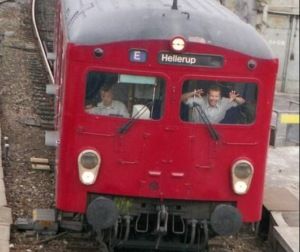Opinion
Straight No Chaser: Public transport is a vital service that should be free
Stephen Gadd
This article is more than 6 years old.

A cost worth ‘bearing’ for tax-payers (photo: Flickr/ Hunter Desportes)
Benjamin Franklin once said the only certainties in life were death and taxes. I’d like to add to that increased ticket prices on Danish public transport.
Cross my heart …
Despite promises to the contrary as recently as last March, the national rail operator DSB has just announced ticket price ‘adjustments’ averaging 2.1 percent for using the bus, train and Metro in Zealand.
Additionally, prices will also go up on the Rejsekort travel card, Pendlerkort commuter card and single tickets for journeys in Funen and Jutland, while the trip across the Øresund Bridge will also rise – by an average of 2.7 percent.
Politicians keep assuring the public that they are really taking global warming seriously and doing their utmost to cut down on CO2 emissions. However, the reality seems somewhat different.
Petrol heads rule
After a promising start in 2008 that encouraged people to buy electric cars through scrapping the registration tax, sales have more or less completely stagnated due to heavy-handed political meddling.
Lip-service is continually being paid to the idea that public transport is a vital tool for protecting the environment and that we need to reduce car use, but the car and the motorist still seem paramount.
The transport minister, Ole Birk Olesen, wants to build a bridge from Zealand to Jutland, turning Samsø into little more than a motorway junction along the way. The bridge is to be financed by the users – in other words, it is primarily designed for motorists. Protests have forced the minister to at least consider adding a rail element, but it is obvious he has little enthusiasm for the idea.
My precious
When the new Metro City Ring opens, a two-tier pricing system will come into effect in Copenhagen. After a decade of inconvenience, delays, hideous levels of noise pollution and unsightly construction sites all over the city, travellers will be rewarded by having to pay a so-called ‘quality supplement’ of 1.60 kroner to use the Metro in the rush hour and 1.28 kroner at other times.
When quizzed on the fairness of this on DR Nyheder, a politician stated: “The important thing is that people who don’t use the Metro don’t end up paying for it.”
Now I don’t actively use schools, and so far (thankfully) my use of the health service has been limited, but I wouldn’t dream of demanding exemption from tax for that reason.
Turning the tide
These buccaneering economic liberals must be given a run for their money. We must turn the tide and aim for solutions that benefit ordinary people and the environment – and time is running out climate-wise.
Inspired by London perhaps, Socialdemokratiet had a go with its proposed road-pricing scheme. That ended before it started, sacrificed on the altar of popular protest.
A more viable idea could be to make public transport (or parts of it) free and paid for through taxation.
There are a surprisingly high number of precedents. Tallinn recently joined the club and Luxembourg is set to be the first country in the world to make all public transport free from the summer of 2019. Germany is considering the idea as a response to the threat of an EU fine for its air pollution levels.
So why not Copenhagen too? Denmark is always keen to trade on its green credentials, and this would be something it could be genuinely proud of.

About
Stephen Gadd
An Englishman abroad, Stephen has lived and worked in Denmark since 1978. His interests include music, art, cooking, real ale, politics and cats.










































